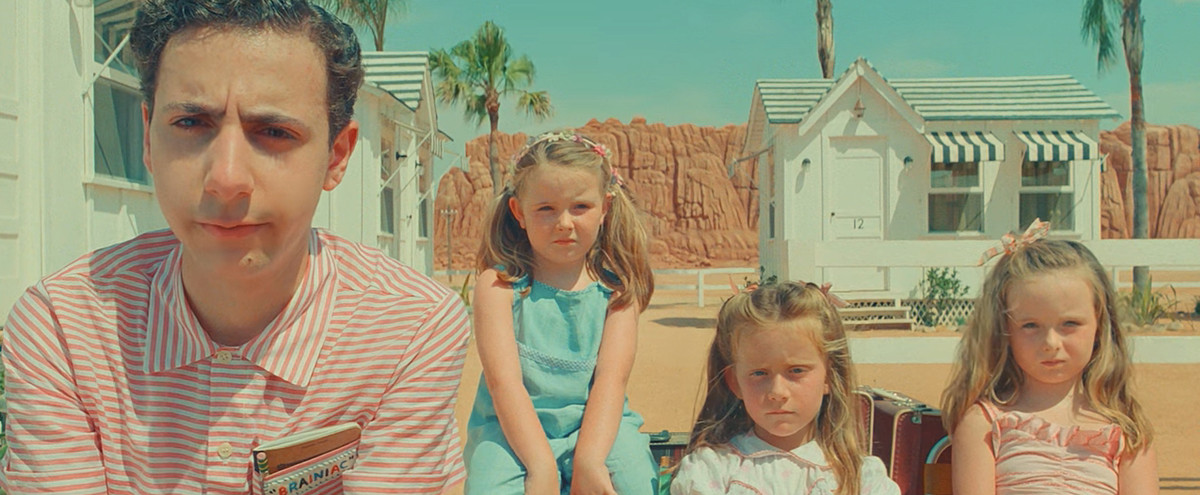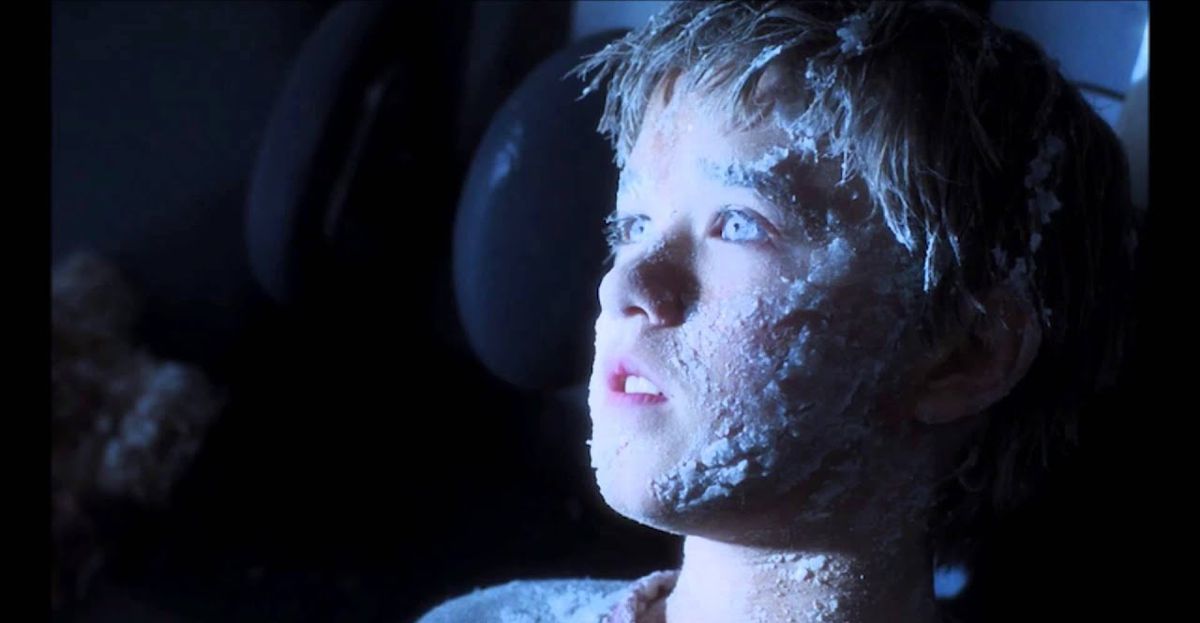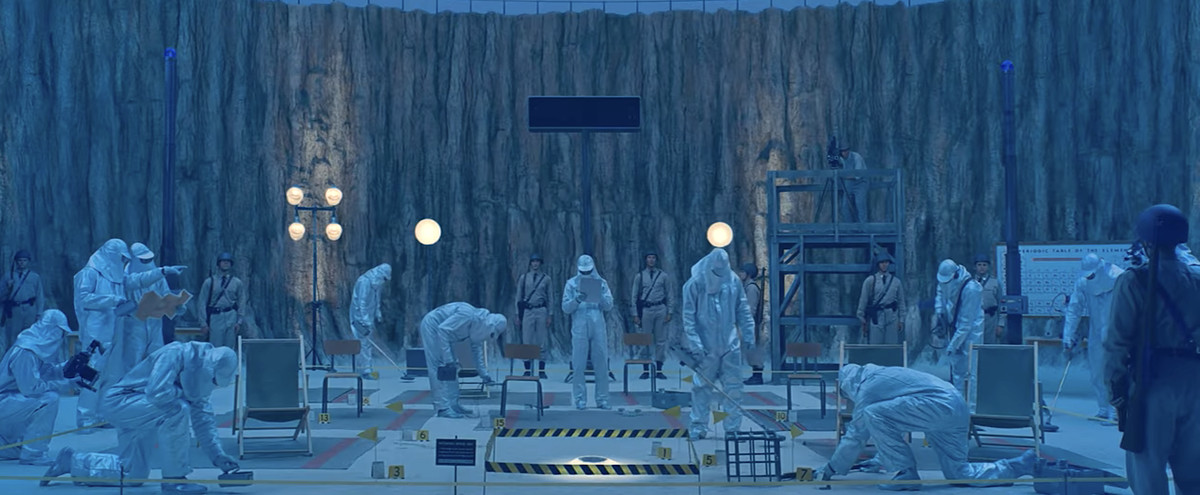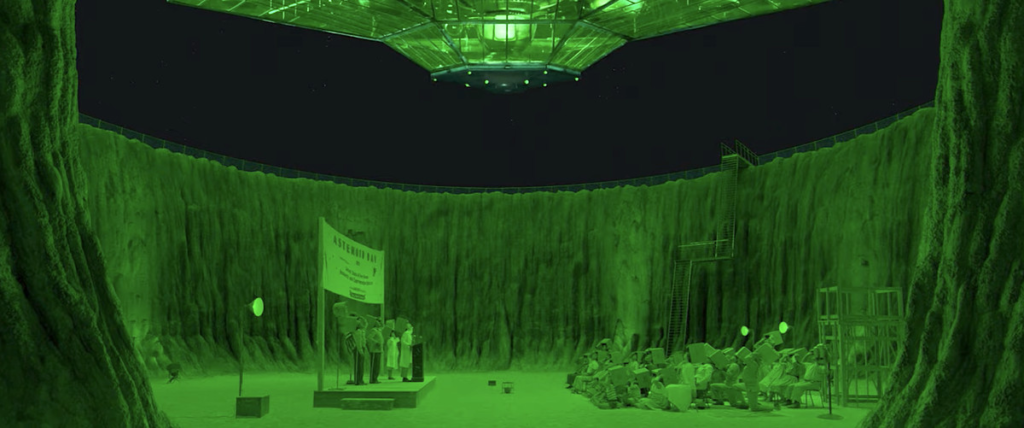Deep in its closing credits, the new Wes Anderson movie Asteroid City features an unexpected name. In the “special thanks” section toward the end of the roll, listed alongside Anderson friends and past collaborators like Noah Baumbach and Jake Paltrow, is Steven Spielberg, the most commercially successful director of all time. These two filmmakers seem pretty far apart: Spielberg is best known for making popular entertainment, whether in the form of thrilling, fantastical adventures or sobering journeys through 20th-century horrors. Anderson is known for the meticulous construction of deadpan-comic worlds. With Asteroid City, though, their connection becomes clearer: They both use science fiction to explore the loss and melancholy of fractured families.
Anderson isn’t known as a sci-fi or fantasy director — but then, those are no longer Spielberg’s principal genres, either. Beyond any cracks about his movies seeming to take place on another planet entirely, Anderson’s last overt science fiction film was 2018’s dystopian stop-motion story Isle of Dogs, while 2014’s The Grand Budapest Hotel contains elements of fantasy and alternate history, and 2004’s The Life Aquatic with Steve Zissou features fantastical, fictional creatures. Asteroid City likely credits Spielberg because it takes some inspiration from 1977’s Close Encounters of the Third Kind, Spielberg’s first real sci-fi movie: When an alien ship makes contact with humans in the American desert in Asteroid City, the event somewhat mimics Close Encounters.
Close Encounters famously ends with a journey that Spielberg has since mused he wouldn’t have been comfortable with later in his career — Roy Neary (Richard Dreyfuss) definitively leaves his wife and children, enters the visiting spaceship, and ascends with its mysterious beings into outer space toward points unknown. (Technically, Roy’s family has left him at this point due to his obsession with the aliens, but leaving Earth feels a bit more definitive on his end.) In Asteroid City, the aliens don’t exert quite so much physical power over the central family, led by Augie Steenbeck (Jason Schwartzman). The mother of Augie’s four children has already left, though not voluntarily. Weeks before their desert trip, she succumbed to an illness that sounds like cancer, and on the day of the alien visitation, Augie finally breaks the news to his kids.
The alien encounter does, however, change the Steenbeck family, particularly Augie’s teenage son Woodrow (Jake Ryan), who is both fascinated and unsettled by the idea that humanity isn’t alone in this universe. Evidence of our potential insignificance overwhelms him. It’s a notable reaction, because Anderson characters so often seem to be preemptively fighting off that sense of smallness, obsessing over their own hobbies or worlds as a way of exerting control in a messy, unpredictable world. Woodrow’s grief over his mother dovetails perfectly with his crisis of faith, because few things feel as messy or destabilizing as changes to your family.
That’s something Spielberg understands particularly well, and something that’s almost always present in his sci-fi movies. E.T. the Extra-Terrestrial features a family fractured by divorce: The father has moved away, leaving an ex-wife to struggle and his son Elliott (Henry Thomas) feeling insecure and lonely. Spielberg’s War of the Worlds gives another absentee father a (terrifying) chance to reclaim his child-raising bona fides in the midst of a deadly alien attack. Minority Report gives a more dedicated father (played by the same actor, no less!) a form of closure after a devastating loss. A.I. Artificial Intelligence, perhaps Spielberg’s best and boldest sci-fi film, follows a robot boy programmed to simulate familial love, then cast adrift when the family he serves no longer needs him to fill a particular void in their lives.

Like Spielberg’s work in the genre, Anderson’s sci-fi stories often feature families that are already fractured at the beginning of the film. Atari (Koyu Rankin) has lost his parents at the outset of Isle of Dogs, which makes it all the more important to him that he retrieve his dog and best friend Spots (Liev Schreiber) from island exile. (It’s similar to the protective zeal Elliott feels for E.T., his own nonhuman pal.) Steve Zissou (Bill Murray) of The Life Aquatic, like Tom Cruise’s Ray from War of the Worlds, has essentially abdicated his role as father in favor of pursuing a life he pictured as a carefree younger man — though Steve is further gone, in that the child (referred to as “possibly my son”) grows into an adult before Steve has any contact with him.
The filmmakers’ characters are often drastically different. So are their technical approaches as directors: Spielberg favors propulsive movement in his stories, while Anderson engineers smaller gestures within frames that often look like impossibly detailed comic strips. Because of these very different forms of spectacle, and their respective interest in fantastical trappings, both filmmakers are sometimes mistaken for childlike or faux-innocent.
Yet while they both look at fantastical images through the perspectives of children, they also use the kid-with-his-train-set dynamic Spielberg depicts in The Fabelmans — no surprise that images of a train bookend Asteroid City, or that The Darjeeling Limited takes place largely inside of one — to move beyond simple Spielberg-face awe. Instead, they each convey a sophisticated understanding of how we process loss, and how we relate it to our place in a larger world.
Spielberg’s sci-fi trappings often seem to exist to clarify the gulfs between family members, which can’t always be bridged. Think back to the precog Agatha in Minority Report, describing her vision of an alternate life for the son John Anderton (Cruise) has lost, her visions as heartbreakingly clear as genuine memories. Or to the thousands of years little robot David (Haley Joel Osment) lives out, as his programming persists past the waning days of the humanity he’s supposed to imitate.

Anderson, meanwhile, sometimes takes a more meta approach, which fits with his characters’ self-consciousness. In Asteroid City, for example, the sci-fi story of the alien encounter is just one layer of the worlds within worlds that Anderson creates. The story — described as a play, framed as a TV show — frames its scenes from a distance, as a way of grappling with the infinite nature of the universe. Sci-fi is a way of peering into the unknown, even if at some point we have to flinch.
This is the depth that imitators often miss with Anderson and Spielberg. (Another unexpected stretch of common ground between them: They’ve both spawned numerous copycats.) Spielberg imitations tend to come from movies stuck in an ’80s-nostalgic idea of what his films are like, but the imitators are often thinking of E.T. and some Amblin movies Spielberg produced decades ago. Anderson imitations are more likely to be parodies and impressions of his style. (Although some actual feature-length movies have been influenced by his style without really capturing his tone — looking at you, Paddington!)
What the imitators lack, though, and what the genuine articles share, is the sense that loss and grief recalibrate our personal worlds, recontextualizing them and — in ways that can be strange or even terrifying — opening them up.
Despite Spielberg’s reputation for uplift, his sci-fi interventions don’t always demonstrably heal the family in any given story. War of the Worlds is more of the exception than the rule in this regard, and that film involves the family experiencing a truly horrific level of carnage (not to mention actual murder committed by Ray) on its way to a happy-for-now ending. There’s a similar baptism-by-fire effect (though on a much smaller scale) with The Life Aquatic, where Steve must survive even more loss ahead of a Close Encounters-like moment between humans and another species.

Steve’s heartbreaking reaction to the Jaguar Shark — “I wonder if it remembers me” — is more solipsistic than indicative of concern about his makeshift family. But it provides a window into the panic and emptiness he feels as he realizes that those closest to him aren’t any more permanent on this Earth than he is.
Anderson does deliver a more traditional resolution in Isle of Dogs, featuring heroism and positive change for his near-future dystopia. Atari’s quest is fulfilled, and a new form of domestication achieved. That’s a more straightforward wrap-up than just about any of Spielberg’s big sci-fi projects get, save perhaps Ready Player One.
Asteroid City, on the other hand, implies that the Steenbecks will have to muddle through their losses as best they can, like the family in E.T., minus that cathartic John Williams-scored emotional crescendo. It’s telling that despite the framing devices that call attention to the artifice of the desert-set portion of Asteroid City’s story, the movie still ends within that play-within-a-show. Far more than the many filmmakers who attempt to channel Spielberg’s crowd-pleasing mojo, Anderson is capable of conjuring real wonder with his version of science fiction. But as with Spielberg, his work resonates because it doesn’t neglect the empty spaces left in our lives, no matter how much wonder we experience.

